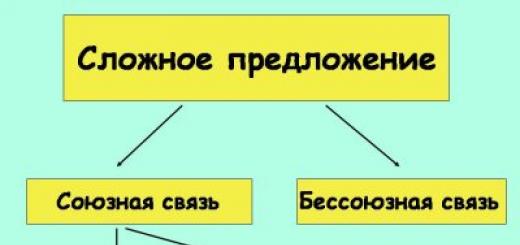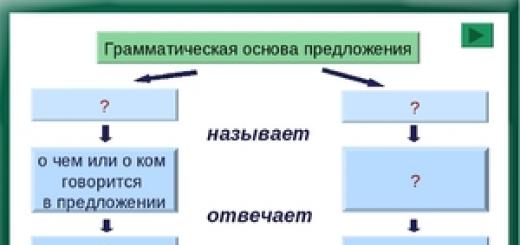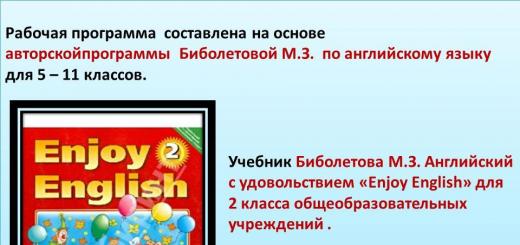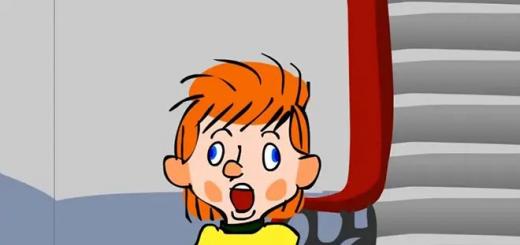In the center of the word connections of each sentence are words that create a grammatical basis (predicative), in fact, this is the main distinguishing feature of the sentence as a syntactic unit. That is, the grammatical basis is the organizing center, a kind of frame, skeleton, or the so-called main members of the sentence - the predicate and the subject. They are not called the main ones in vain, since they are grammatically independent of other members, occupy a dominant position in the sentence. The predicate and the subject mutually presuppose each other. Thus, the subject names the subject of speech. And the subject of speech affirms, denies, characterizes by action, sign, time, reality, etc.
Usually the main members of the proposal are an obligatory part of it. Some of them are enough for the sentence to be a formalized unit grammatically and in meaning. Often there are sentences where there is only a grammatical basis. Examples: The sun is shining. Children are playing. Such proposals are called non-common, because. do not have secondary members of the sentence. If the proposal also includes other members of the proposal (secondary), then such a proposal is called common, for example: On the street children play.
In addition, the grammatical basis of a sentence can consist of both a subject and a predicate (two-part sentences), or only one of the main members, for example: Our children- our joy (two-part). Autumn. I love autumn(one-piece).
Also, depending on the number of grammatical bases, sentences are classified as simple and complex. If a sentence has one grammatical basis in its composition, then these two or more bases are complex. For example: Go torrential rains (simple sentence). Very soon will fall out snow, and will begin real winter (difficult sentence).
Without fail, it begins with the definition of the grammatical basis. For its correct definition, one should be able to find its components - the subject and the predicate. To do this, you need to know with what parts of speech the grammatical basis can be expressed.
Thus, the subject is expressed:
- Noun: Coming soon snow.
- Adjective name: New requires a lot of knowledge.
- Communion: Speaking often wrong.
- Infinitive: Live means to feel.
- (interjection, adverb, preposition, particle, union): To us tomorrow enters bright and radiant.
- Collocation: We are with friend went fishing.
The predicate is expressed:
- Verb: Costs good weather.
- Noun: Moscow - capital Russia.
- Adjectives: to me mil poems Russian fever.
- Comparative adjectives: Every day of separation for me longer of the year.
- Adverb: All of us Good.
- Communion: Our family involved to science.
- A stable phrase (phraseological unit): My health - no whoa, no no.
In addition, pay special attention to the correct definition of the compound nominal predicate, which consists of a linking verb and a nominal part ( He will soon become an astronaut ) and a compound verbal predicate, also consisting of two parts: an auxiliary verb and an infinitive ( You must go to the meeting).
It should be noted that the correct definition of grammatical foundations helps to avoid mistakes in punctuation. So, in a complex sentence, punctuation marks are necessarily placed, denoting the boundaries of the simple sentences that make up their composition. The ability to determine the subject and predicate will help to correctly place it in a simple sentence, if both main members of the sentence are expressed by the same parts of speech, and in some other cases.
An educated person is distinguished, first of all, by his ability to correctly express his thoughts both orally and on paper. In order to follow the rules of punctuation, you need to know everything about the main members of the sentence.
The grammatical basis of the sentence (aka predicative) consists of the main members of the proposal, which are subject and predicate . Usually the subject is written out and singled out with one line, and the predicate - with two.
In contact with
The article answers the most important questions:
- How to find the grammatical basis of a sentence?
- What members of a sentence make up its grammatical basis?
- What is the grammatical basis?
The subject is a word that indicates the subject to which the predicate refers. For example: The sun came out from behind the mountains. The sun is the subject expressed by the noun. A wide variety of parts of speech can act as a subject.

The subject can be expressed not only by single words, but also by phrases.
- The combination of a noun in the nominative case with a noun in the instrumental case. For example: Katya with Arina love to figure skate.
- A pronoun, as well as a numeral and an adjective in the superlative degree. For example: The most daring stepped forward.
- A pronoun or noun in the nominative case combined with a participle or adjective. For example: Someone bad tore her album with drawings.
- A combination of a numeral in the nominative case and a noun in the genitive case. For example: seven guys went out into the yard.
Interestingly, the subject can be even a phraseological unit.
Predicate
The predicate is related to the subject and answers questions such as “what does the object do?”, “what happens to it?”, “what is it?”. The predicate in a sentence can be expressed through several parts of speech:

Compound predicates
The predicate often consists of several words. Such predicates are called compound. Compound predicates can be verbal or nominal.
Composite verbal predicates are expressed in the following ways:

Compound nominal predicate may consist of:
- The linking verb to be and the short adjective. For example: Today Margarita was especially beautiful.
- Verbs to become, to be, to be and other semi-significant verbs in combination with a noun. He finally became a doctor!
- Verbs that have the meaning of the state of an object. Marina works as a teacher.
- Verb combined with an adjective in different forms. His dog was prettier others.
In a two-part sentence, both main members are present. However, there are also sentences in which only one main member is used. They are called singletons.
The subject in one-part sentences is most often a noun in the nominative case.
It can be expressed by means of a verb in its various forms.
 In one-component definitely personal In the sentence, the predicate is expressed by the verb in the first/second person, singular/plural and present/future tense in the indicative mood, or by the verb in the imperative mood. Today I'm going for a walk. Don't touch the dirty dog!
In one-component definitely personal In the sentence, the predicate is expressed by the verb in the first/second person, singular/plural and present/future tense in the indicative mood, or by the verb in the imperative mood. Today I'm going for a walk. Don't touch the dirty dog!
In a one-part indefinite-personal predicate, the verb is in the third person and plural, present, future or past tense in the indicative mood. Also, the predicate can be expressed by the verb in the imperative or conditional mood. There's a knock on the door! Let him call Aunt Dasha. If I had been informed earlier, I would not have been late.
AT generalized-personal In a sentence, the predicate is expressed either by a verb in the second person singular or plural, or by a verb in the third person and plural. This is how they talk to visitors now.
In one-component impersonal the predicate is a verb in the form of the third person singular and the present or future tense. Also, the predicate can be a neuter verb in the past tense or conditional mood. Makes me sick. It was getting dark.
It is important to remember that the number of grammatical bases in a sentence is not limited. How to determine the grammatical basis of a complex sentence? The grammatical basis of a complex sentence is as easy to determine as the basis of a simple sentence. The difference is only in their number.
Grammatical basis: subject and predicate
Task Formulation:
Write out the grammatical basis of sentence 22. Because in our school they are creating a museum for the Great Victory Day.
Correct answer: create What you need to know:
The concept of the grammatical basis of a sentence
Difficulties in determining the subject
Difficulties in determining the predicate
Task 8 is related to task 11 of the OGE in Russian, in which it is required to indicate the number of grammatical bases in a complex sentence. Given the specifics of task 8, where it is required to write out the grammatical basis, we will not analyze the theoretical material in detail, but consider the main "pitfalls" that you can encounter when determining the grammatical foundations of sentences.
The grammatical basis of the sentence
GRAMMATICAL BASIS- this is the basis, core or main part of the sentence, which consists of its main members: subject and predicate: An old one grew under the window oak, which the in the summer heat gave silence and coolness. Proposal core: the oak grew, which gave
Difficulties in determining the subject
To correctly highlight the subject, it must be remembered that
the subject denotes the actor (object) and answers the question who? what? The words ME, YOU, HER, US, YOU, HIM, THEM answer the question to whom? and subject are not:to me don't like this onecolor . (in this sentence, the subject iscolor . as he performs the action);
in the subordinate part of a complex sentence, the role of the subject is often played by allied words WHICH, WHICH, WHICH, WHICH, WHAT:Book,which lay on the table, was open.(in the subordinate part, the object that performs the action is called the word which - this is the subject);You never know,what tomorrow awaits you;
a word with a quantitative meaning + a noun in the genitive case: Several people came to the lecture later. On the shelf wasfive books. About a thousand offers Received in the newspaper from readers:
subject can be expressed word in the nominative case + FROM + word in the genitive case:Each of us wanted to be excellent.Many of the critics the manuscript was fairly evaluated;
subject can be expressed a word in the nominative case + C + a word in the instrumental case (if the predicate is in the form of a plural chila):Me and Tamara we go as a couple;
subject can be expressed a proper name consisting of several words:Black Sea very beautiful.
To correctly highlight the predicate, it must be remembered that
The predicate denotes the action of the subject and answers the questions: what does the subject do? what is the subject? what it is?;
the predicate can be simple or compound;
Difficulties in determining the predicate
Simple verb predicate
Can be expressed:
verb in the form of the indicative, imperative or conditional mood: I I draw . draw something.Let's somethingdraw . Let him draw something.would draw something.She is nothingdidn't draw . Please note: particles GET IT, LET IT, WOULD NOT are part of the predicate, even if there are other words between them and the verb;
phraseological unit or descriptive phrase:Two students believed the raven all day(= idled).HeParticipated in in the census(= participated);
verb in the future tense: Each of us will read book. She iswon't go to the cinema.
Compound verb predicate
Can be expressed:
auxiliary verbwith the value of the beginning, end, continuation of the action + infinitive:Hiskept asking sing another song(= asked). He began to worry about the exam(= worried). me and my brother finished writing letter(= wrote);
auxiliary verbwith the meaning of desire, possibility, desire for action + infinitive:Tatyana Larina dreamed of seeing with Evgeny.I would like to hand over exam.He seeks to enroll to university.Alexei could betterto study;
auxiliary verbwith the meaning of thought, feeling + infinitive:He afraid to be late to school.Me and mom we don't like to travel . Relatives expected to come to visit;
short adjective RAD, MUST, CAPABLE, OBLIGED, READY, INTEND, AGREE, FORCED + infinitive:We were ready to come to the meeting.I obliged to inform about what happened.He intends to win party;
words NECESSARY, NECESSARY, NECESSARY + infinitive:to menecessary betterget ready to the exam. to mehad to get away .
When is the infinitive not part of the predicate?
it is necessary to take into account the meaning of the predicate: They are start preparing to exams. (In this sentence, only the word "begin" cannot be singled out as a predicate, since it does not name the main action that "they" perform.WhenAndrew will finish work,Igor onlywill start . In this sentence, the verbs "will finish" and "begin" acquire the meaning of independent actions and are simple verbal predicates;
if the verb and the infinitive denote the actions of different persons, then we have a simple verbal predicate. The infinitive must have the meaning of the will (to ask, beg, order, persuade):Hisasked to write an application.Predicate hereasked , and the word "write" is an addition (askedabout what? write);
if the infinitive depends on the verb of motion, then we have a simple verbal predicate and a goal circumstance:He came to learn about the health of the aunt.(camefor what purpose? to know);
if you can ask the question WHAT? to the infinitive, then we have an inconsistent definition, and not part of the predicate:Ojota wanderattacked on him.(huntingwhich? wander).
Compound nominal predicate
Can be expressed:
the linking verb BE (IS, I WILL, WILL BE, WOULD, LET IT BE and other forms) and the nominal part (noun, adjective, numeral, pronoun, participle, adverb): brother soonwill be a student;
the linking verb BE, APPEAR, BECOME, BECOME, LOOK, BECOMING, RECOGNIZE, BE and the nominal part: She iscame herebyprofessional in your area. Childlooked absolutelyconfused . Sunseemed red .
a linking verb with the meaning of movement, position in space + nominal part:Autumncame rainy. Doglay calm.
How to distinguish a simple verbal predicate from a linking verb?
Compare offers:Anyaseemed upset (= was upset) andfar awayseemed small village(= appeared, saw). Obviously, in the first example we havecompound nominal predicate with a linking verb , and in the second example, the verb "seemed" gets a full-fledged lexical meaning and it can only be replaced by another full-fledged verb, therefore, issimple verb predicate . More examples:Mom became thoughtful (= became thoughtful, thoughtful) andAfter the item is brokenwill not be done by itself(= won't fix).
The Russian language is rich and powerful. You cannot know all the rules, but you need to strive for this. Let's do just that today.
What words are grammatical?
Each sentence contains a grammatical basis. The constituents of the grammatical basis of a sentence are the subject and the predicate. The secondary members of the sentence indirectly or directly share these words. The grammatical meanings of the construction are determined by the meaning of the mood and tense of the predicate expressed by the verb. For example:
- "The ball goes straight into the goal." The action of the subject is happening, and is happening at the present time.
- "The ball went straight into the goal." The action of the subject took place, and took place in the past tense.
- "The ball would fly into the goal." The action of the object does not occur, but is expressed in a wish.
Grammar basis: examples
The subject and predicate in a sentence can be expressed in different ways, sometimes taking unusual forms. Therefore, it is necessary to analyze in more detail the concept and examples of the members of the sentence that make up the grammatical basis.
The subject is the main member of the sentence and denotes the object that performs any action. The subject answers the questions "who?" and "what?", characteristic of the nominative case. The following examples will help you identify the correct subject in a sentence:
- The subject is a noun in the nominative case. "The dog tucked its tail."
- The subject is a pronoun in the nominative case. "I saw", "Who brought the apples?". "That's funny". "It's their child." "The purse that was found belonged to Marina" (subject in a subordinate clause). "The leaf that fell into the alley seemed to be fiery red" (subject in a subordinate clause). "Someone will see." "Everyone was quiet."
- The subject is the indefinite form of the verb. "Being brave is already a victory." "To listen is to hear." "To break is not to build."
- The subject is a combination of several words (one in the nominative case). "My brother and I rarely quarreled."
- The subject is a combination of several words (without the nominative case). "Two birds sat on the windowsill"
The predicate is the main member of the sentence, associated with the subject and having the expressed question "what does he do?" meaning. Also, questions characterizing the predicate include "what is he?", "what he is", "who is he?". For example, "I drank about a liter of water"
The predicate is the main member of the sentence, associated with the subject and having the expressed question "what does he do?" meaning. Also, questions characterizing the predicate include "what is he?", "what he is", "who is he?".
Speaking about what a grammatical basis is, it is impossible not to cover the concepts of a simple and a compound predicate. The first expresses the verb in the form of any mood. The compound is expressed by several words, of which one connects it with the subject, while others carry a semantic load. For example: "His mother was a nurse" - the verb "was" connects the predicate with the subject, and "nurse" carries the semantic load of the predicate. Those. in this sentence, the predicate is "was a nurse."
A compound predicate can be a compound verb and a compound nominal. A simple verbal predicate can be expressed using a verb of one of the following forms:
- The verb form is present tense and past tense. "He runs fast." "My sister didn't hear the call."
- The form of the verb in the future tense. "I will be asked tomorrow."
- The form of the verb is conditional or imperative. "I wouldn't go to that yard." "Let him eat what he wants."
Summing up, we can say that the grammatical basis expresses the grammatical meaning of the construction and the number of grammatical bases in a sentence, as a rule, is not limited.
grammatical basis sentences form the main members of the sentence ( subject and predicate). That is, the grammatical basis of the sentence (predicative basis, core) is the main part of the sentence, which consists of its main members: the subject and the predicate. See also introductory words..
Subject.
Remember!
Subject can be expressed not only by a noun or pronoun in nominative case, but also:
| 1) numeral, adjective and participle in I.P. as a noun; Seven (num.)one is not expected. All Past (adj. as noun)I only dreamed. |
2) designs: Numeral / several, many, part, majority, minority + noun in R.P.; The prince gathered in the sakla multitude of people. Several ladies were walking quickly up and down the square. Someone, everyone, many / adjective + of + noun in R.P.; The best student solved this problem quickly. Someone, something + adjective, participle as a noun; Something so insignificant tied in a scarf. Noun / pronoun + c + noun / pronoun in Tv.P. ( but only if the predicate is expressed by the verb in the plural!). Vanya and Iwent along the forest road predicate in plural.). Annawith her daughter in her arms entered the room (predicate in singular). |
3) an infinitive that names an action that does not occur in time. livein a lordly way - this is a noble affair |
Predicate.
There are three types of predicates in Russian. The following algorithm of actions will help you determine which type is represented in your proposal.
Distinguish!
If there are homogeneous predicates in the sentence, then each of them should be considered separately.
Also watch the video presentation.
Clue.
1) Most often, doubts are caused by the definition of a simple verbal predicate, expressed in more than one word:
I I will take part in the exhibition.
In this example I will take part- a complex form of the future tense, which is defined in syntax as a simple predicate. And the combination participate is a phraseological unit that can be replaced by the word I participate. Therefore, we have a simple verbal predicate.
Trap!
Often they make a mistake, calling the following construction simple verbal predicates:
Everything in Moscow is saturated with poetry, pierced with rhymes.
This error is due to two factors.
First, a short passive participle should be distinguished from the past tense form of the verb.
Remember!
The short participle has suffixes -T-, -N-, and the verb -L-. Means, impregnated, pierced are short passive participles.
Secondly, we have a predicate that is expressed in just one word, but what is it - simple or compound (see Morphological analysis of a word with examples)? Try adding some adverbial tense to the sentence, for example, at the beginning of the twentieth century, and see how these forms behave.
At the beginning of the 20th century, everything in Moscow was saturated with poetry, rhymes were pierced.
A bunch appears It was and the predicate already clearly becomes compound. The Russian language is not characterized by constructions in the present tense with a bunch to be. Agree, it sounds clearly foreign if we say: All in Moscow there is impregnated with verses, rhymes there is pierced.
Thus, if in a sentence you encounter predicates expressed by short passive participles, then you are dealing with compound nominal predicate.
Remember!
The words can't, can, must, must included in composite predicates.
to me need to get off at this stop.
Trap!
Be careful with words to be, to appear, to be, because by highlighting only them, you can skip one more component of the predicate.
She seemed funny to me.Wrong!
If you highlight only the words seemed, then the meaning of the sentence is completely changed ( seemed = dreamed, dreamed, imagined).
Right: She seemed funny to me
Wrong: The teacher was strict (was = existed, lived).
Right: The teacher was strict.
Trap!
In this task, quite complex sentences are offered for analysis and the answer options are very often similar to each other. What "traps" can you expect here?
1) Offers can be made according to different models:
- subject + predicate;
- only predicate or subject (single-member sentences);
- subject + homogeneous predicates;
- homogeneous subjects + predicate.
In the answer option, the subject, predicate, or one of the homogeneous subjects or predicates may be omitted.
Remember!
The grammatical basis includes ALL the main members of the sentence, the omission of one of them is a clear mistake.
2) In the answer option, the subject and predicate of different grammatical bases can be combined.
3) The subject can only be in I.P.! Answer options with nouns, pronouns not in I.P. deliberately incorrect (except when they are part of the predicate and without them the whole meaning of the sentence changes).
4) The answer option may contain participial or participle turnover, which are never included in the grammatical basis.
Distinguish!
Structures should be distinguished verb + noun in V.P. and noun + passive participle.
The coordinates were calculated. ? Coordinates calculated.
AT first case coordinates is a noun in the accusative case that depends on the verb (i.e. addition), and in second is a nominative form that agrees with the past participle (i.e. subject). If you change each of the designs, the differences will be visible. Let's put the predicates in each of the sentences in the singular form:
Calculate coordinates. coordinate calculated.
The subject and predicate always agree with each other, and the object will remain unchanged.
5) Sometimes words which, which in complex sentences are subjects.
[And shiny droplets crawled down his cheeks] , (which are on the windows during the rain). (which = droplets).
Parsing the task.
1. Which of the combinations of words is the grammatical basis in one of the sentences or in one of the parts of a complex sentence?
(1) So what is the difference between human and animal perception? (2) For an animal, only concrete things exist; its perception is inseparable from the real environment in which it lives and acts. (3) So, for example, the "television version" of a dog means nothing to a cat. (4) Man, in the process of evolution, acquired a unique ability to create ideal images of reality in his imagination, but they no longer seem to be a direct cast from a specific thing. (5) Thanks to the development of cognitive activity, in particular, the processes of abstraction and generalization, a person can isolate any individual features of the object being studied, being distracted from all other, insignificant details. (6) Thus, a person has the ability to form a generalized image of a real thing, which allows you to see and recognize common features and qualities of various phenomena of reality.
1) perception is (sentence 2)
2) acquired the ability (sentence 4)
3) they are not represented as a cast (sentence 4)
4) which allows you to see (sentence 6)
Option number 1 is not a grammatical basis, since here the predicate is not fully represented, which distorts the meaning of the whole sentence (perception is = in the meaning of “comes, arrives somewhere for some reason”). See point 3 in the Predicate section.
Option number 2 is also incorrect, since it lacks a subject. Who acquired the ability? In sentence 4, the subject is the word human.
Option number 3 true, although at first glance it seems wrong. The authors of the task are deliberately trying to confuse us. Although the word cast does not stand in the form of I.P., but it is part of the predicate, since without it the logic of the narrative is lost. They do not introduce themselves = Images do not call their names?!
Option number 4 incorrect . The subject is highlighted correctly. Word which the, as we have said, may be subject. In the subordinate part, it is replaced by the word image and performs the same functions, that is, it is the subject. But the predicate is not fully represented. In the offer it is allows you to see and recognize.
So way, the student who chooses option 3 will be right.
2. What words are the grammatical basis in the sixth (6) sentence of the text?
(1)… (2) They are united by one desire - to know. (3) And their age is different, and the professions are very different, and the level of knowledge is completely different, but everyone strove to know more than they already know. (4) This expressed the need of millions and millions of people, eagerly absorbing all the secrets of the world, all the knowledge and skills accumulated by mankind. (5) Library visitors either studied somewhere or dreamed of studying. (6) They all needed books, but when they came to the library, they got lost in the ocean of books. (7) ... (According to K. Chukovsky).
1) books were needed, they were lost
2) they needed, they were lost
3) books were needed, coming here, they were lost
4) books were needed, they were lost in the ocean
The right one is Option 1, since in the remaining options, the second included secondary members of the sentence in the basis: in the second, the word is superfluous them (addition, stands in D.P.), in the third there is a participial turnover that is not included in the basis of the sentence, and in the fourth there is a circumstance in the ocean.
3. What combination of words is the grammatical basis in one of the sentences (or part of it)?
(1) ... (2) She will die of hunger if the gate is strong and no one opens it, but does not guess to move away from the gate and pull it towards her. (3) Only a person understands that one must endure, work hard and do not what one wants, in order to get what one wants. (4) A person can restrain himself, not eat, not drink, not sleep, only because he knows what is good and should be done and what is bad and should not be done, but his ability to think teaches him this. (5) Some people increase it in themselves, others do not. (6)…
1) she will die (sentence 2)
2) what you want (sentence 3)
3) what is good and should do (sentence 4)
4) teaches ability (sentence 4)
This is an advanced task.
Option number 1 incorrect, since not all predicates are indicated by the authors. The proposal has a rather difficult structure for analysis. It is complex with a subordinate clause that is wedged between two homogeneous predicates. Therefore, you may not notice that the basis she will die must also include the predicate won't think of stepping back and pulling.
Option number 2 is also excluded. Verb I want to is impersonal and cannot have a subject.
Option number 3 similar to the previous one. This offer is also impersonal. Word must in dictionaries it is defined as a category of state, which is used in sentences without a subject.
True is Option 4.










